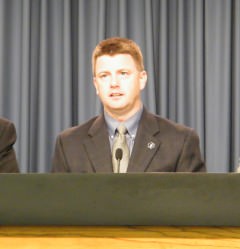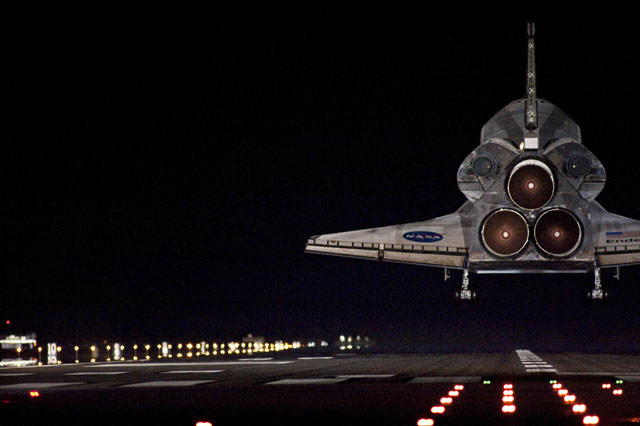[/caption]
Congressional legislators in Florida are mounting a campaign to extend space shuttle operations to 2015, adding two flights each year. U.S. Rep. Suzanne Kosmas said a bipartisan plan is in the works, which would require adding another $200 million to the NASA budget for 2010 and between $1.5 – $2 billion a year starting in the 2011-12 budget year. “We’re not going to do anything that’s not safe,” Kosmas was quoted in Florida Today, adding that securing the funding would be difficult in tight budget times, but “we’re going to go for it,” she said.
At Kennedy Space Center early Monday morning after Endeavour returned home safely following the STS-130 mission, space shuttle program managers confirmed that while the shuttles are in good shape to continue flying, extending the program is not the direction their teams have been headed.
“From a technical, engineering standpoint, there would be nothing stopping the vehicles from being able to fly,” said space shuttle integration manager Mike Moses. “They have a lot of life in them. We talk about the risks and hazards of flying, and that’s a two edged sword. Anytime you’re launching into space is a risky proposition, but this is a vehicle that we understand its risks very well, and we’ve learned how to work around the pieces that can cause us problems – the foam from Columbia is a good example. We’ve come a long way, if you look at the performance of the external tank since then, we have put a set of controls in place that have been paying off and really driving our risk numbers down.”

“So we could continue fly,” Moses continued,” and I’m confident we could fly at the rate and the risk level we have been flying and it wouldn’t be hard to do. But it becomes a political question: Is that the right thing to do? And from a budgetary standpoint can you commit the resources of NASA to go continue to fly those vehicles? The direction that we’re getting from (NASA) Headquarters is that we are going off to do bigger things and explore more. Unfortunately the budgetary realities are we can’t continue to do everything and fly the shuttles as well. So while it’s hard to let go and shut down a program, that’s the way the budget works out. But if you want to turn it around you certainly could there is nothing technically that is stopping you from doing it.”
Kosmas said the budget proposed by President Barack Obama’s is not acceptable as is because it would cede the United States’ leadership position in spaceflight in the short term — and possibly the long term. The plan being drafted would direct NASA to examine ways to build a heavy-left rocket by salvaging work done in the Constellation program. Obama’s budget called for the end of Constellation, the architecture that would return astronauts to the moon.
Additionally, another part of the plan being drafted by Florida representatives would require NASA to report to Congress in several months with specific safety requirements for manned commercial rockets. “Congress is responding to the president’s lack of specificity, lack of an action plan, lack of vision and direction,” Kosmas said.
During my time at Kennedy Space Center the past few weeks, the feeling among NASA workers and contractors is that the space shuttles are now in the best shape they have ever been, and the risks and quirks of the vehicles are understood better than ever. The cloud of job losses and a deteriorating economy now hangs over the workforce at KSC and the mood of the entire Space Coast is tentative at best.
The Augustine Commission recommended the shuttles would have to be recertified if they were to fly after 2010, and Moses said that effectively, the work to recertify them has already been done, and if production on External Tanks and other the shuttles could possibly fly until 2020.

It should be noted that Moses’ and shuttle launch director Mike Leinbach did not bring up the issue of extending the shuttle program, but only were responding to questions asked by several journalists about the possibility of keeping the shuttle program going.
“You guys are really fishing for me to say I want to keep flying the shuttles!” Moses said, while Leinbach expounded more on the reality staring in the face of the workers at KSC, and warned against giving people any false hope.
“We have been very consistent as an agency over the past several years about 2010 being the end of the shuttle program,” Leinbach said. “We have not wavered from that. There were people in the system that didn’t want to believe that. But here we are in 2010 and the reality is starting to hit us. Our direction to shut down the shuttle program after we finish the station is clear. What is not clear is exactly what we are going on to next. You guys are the ones who asked about extending the shuttle program, we didn’t sit up here and mention that. We’ve been very clear with the workforce. It hurts, but they know it is coming. Any talk of extension or anything like that is just … talk.”
What are your views? Should the shuttle program be extended to avoid the lack of US access to space, as well as the loss of aerospace jobs and institutional knowledge? Or is it time to move on?


Yes! And invest in the next step while doing it! 2 missions a year sounds reasonable…for now…especially when considering the personnel and equipment investment already in place… this would allow time for technology and personnel transfers to utilize the ‘creme de la creme’!
This has been kicked around for some time now. Beyond the couple of missions envisioned, substantial resources would need to be invested in the infrastructure needed to produce Shuttle components (such as the external fuel tank) to continue flights. Not an inexpensive proposition.
Aren’t they are ready ten years passed the recommended lifespan?
Aren’t they all ready ten years passed the recommended lifespan?
Its somewhat telling of how absurd politics is that we spend hundreds of billions of dollars on useless wars, instead of investing in something a little more tangible for the FUTURE!
They just don’t want the program to end right before an election, not with the future of space in disarray as it is.
Its unlikely they want to risk an accident either, so I suspect it will be extended indefinitely. You only need one mission every few years for the system to be “operational”.
Its somewhat telling of how absurd politics is, that they would rather spend a billion dollars a flight than run with the opposition parties plan.
Could you extend the shuttle program?
Certainly, IIRC their track record has now shaped up to be the safest vehicles out there, at least US ones. Of course one could design safer vehicles today, the coming Space-X/Dragon would likely qualify. But there is the risk in shaking the program in.
But why would one like to do it? The given reason is beyond the pale: “it would cede the United States’ leadership position in spaceflight in the short term”. What use is “leadership”? That and a couple of dollars will buy you coffee at Starbucks. Actually, the more “leadership” the more dollars you will likely need.
Seeing that US & NASA finally started to cooperate with international and commercial interests, it is a route that detracts resources from the larger goal, to explore, exploit and colonize.
In the perspective that this are local state interests financed by the corporations behind the current infrastructure, it is also detracting from the smaller US goal of paying off its rising debt, coming back to Starbucks above. It is inverse Robin Hoodism. Don’t buy it!
“US & NASA finally started to cooperate with international and commercial interests” – started to cooperate on a larger scale, that is.
Somewhat related, instead of selling the fleet off, why haven’t they created ports where they could permanently dock a shuttle as a lifeboat and retrofit the bay for extra space? I know there would necessarily be maintenance/upkeep while there, but wouldn’t it be easier to do that and have an emergency backup for any catastrophic decompression, fire, solar flare, junk/meteor strike?
I second that, Their last flights should be as an extension to the ISS. From memory they were going to carry spare parts up. What better place to store them?
Also as a monument, It would be fitting to have one in Space. Sets a bit of a statement I think.. A conviction that future generations will appreciate.
In Space.
Damian
What happened to the days of get-it-done, nothing-is-impossible, shoot-for-the-stars American spirit? It was the competition from other countries – as well as inventiveness, courage, luck and a whole LOT of hard work by hundreds of thousands of people – that put a few men on the Moon and set the eyes of the world skyward and made people everywhere – regardless of nationality – proud of what humans can accomplish, with the right focus.
And now? Budget woes (which will really never go away, but just get moved about like unwanted peas on a child’s dinner plate), red tape, committee-laden dead-end procedure, bipartisan bickering and jaded disinterest by the public who care more about weight-loss reality shows and what the Kardashians are up to than any sort of space program, regardless of the trickle-down technology that would inevitably make life easier, better and safer. Is space technology expensive? Yep. But so are a lot of things that have more of a tread-water result than any sort of future potential. And again…where’s the spirit of fearless discovery and exploration that we look for in our historic heroes? Would we be the people who’d have cut their funding and support and told ’em all to just go home?
Under Obama’s proposed plan, only about 10 of our 88 astronauts will make it to space in the next decade, all aboard Soviet-era Soyuz. Not a single astronaut will actually fly a spacecraft. This is a madness only proposed by someone who cares little about American prestige and national security.
For the cost of continuing to fly the shuttle, Ares1/Orion could begin to fly in plenty of time to keep “the gap” small enough for government work. Then we’d have a spacecraft that can do operations beyond LEO. Instead, we might get the Dream Chaser spacecraft, and I can’t believe that it’ll be cheaper than Orion. And we’ll be stuck in LEO.
This seems an argument to keep the shuttle flying because it is a federal jobs-program.
It may be cheaper than what the Russians will charge to get into space. However, more missions by the shuttle to the ISS to deliver groceries and bring back it’s garbage — just to keep jobs in Florida, doesn’t seem justifiable.
To keep things in perspective the “Jobs Bill” cost $154 Billion.
@ J.Major:
“made people everywhere – regardless of nationality – proud of what humans can accomplish”
Wishful thinking.
Fascinated, yes. Proud, no.
Mixed emotions on this. The shuttle is nothing but a cargo truck. Delivering supplies to the ISS. Maybe it’s time to move on and devote our money and time on new technology. The shuttle has done some amazing things, but it’s time to move on. A
I know may KSC workers are scared but I’m sure many of them can find jobs in the outside world. Jobs that want people who spent a good portion of the day shooting the breeze. Eating snacks. Surfing the Internet on their personal iPhones, Blackberry’s, etc. Talking and text messaging friends, etc., on their cell phones. Talent like that will help our country move forward.
Based on the above, I”m not sure many of the existing KSC personnel have the talent to help NASA and our country develop new technology.
@ J Major
‘days of get-it-done, nothing-is-impossible, shoot-for-the-stars ‘
That is thinking from the 50s’ and 60s’ when people still thought of the terrible old Flash Gordon movies, serials when the thugs with black leather jackets were chashing Flash on the Moon and no-one was wearing space suits!!!!. It was soon realized how ultra-expensive and extremely dangerous for humans to venture into outer space. I still have the 1st magazine ‘Space’ published 1959 and forecasted humans will land on Mars by 1970 and land on Pluto by 2000!!!
How little humans really knew what the real Universe is really like !!!!! lol.
@star-grazer
In the 50s and 60s people were thinking of Yeager, Glenn and Armstrong. Yes there was Flash Gordon, but there was also Destination Moon and 2001.
War is also ultra-expensive and extremely dangerous but humans always seem to find the time.
rue Says
Yes, we thought of ‘heroes’ at the time of the 50s and 60s, but we lived in a very serious escalating cold war with the former Soviet Union, the ‘bogeyman’ and terror at the time-the nuclear arms race got out of hand, but both nations was able to take stock and ended the race, but we are still armed to the teeth with about 6k warheads each.
The US needs the rest of the world to use their resouces to increase the knowledge and exploration of space.
IMHO, the SS fleet should be ready for retirement, they are showing their age and wear-to keep them operational will become prohibitably expensive-it’s time to start using cheaper transports and other nations resouces also..
addendum-I should’ve said both Russia and the US has 6k warheads each, a vast improvement over the max of 45k warheads for the Soviet Union and 35k warheads for the US at the peak of nuclear weapons race!!.
I’m always excited about new discoveies being made of the Universe.